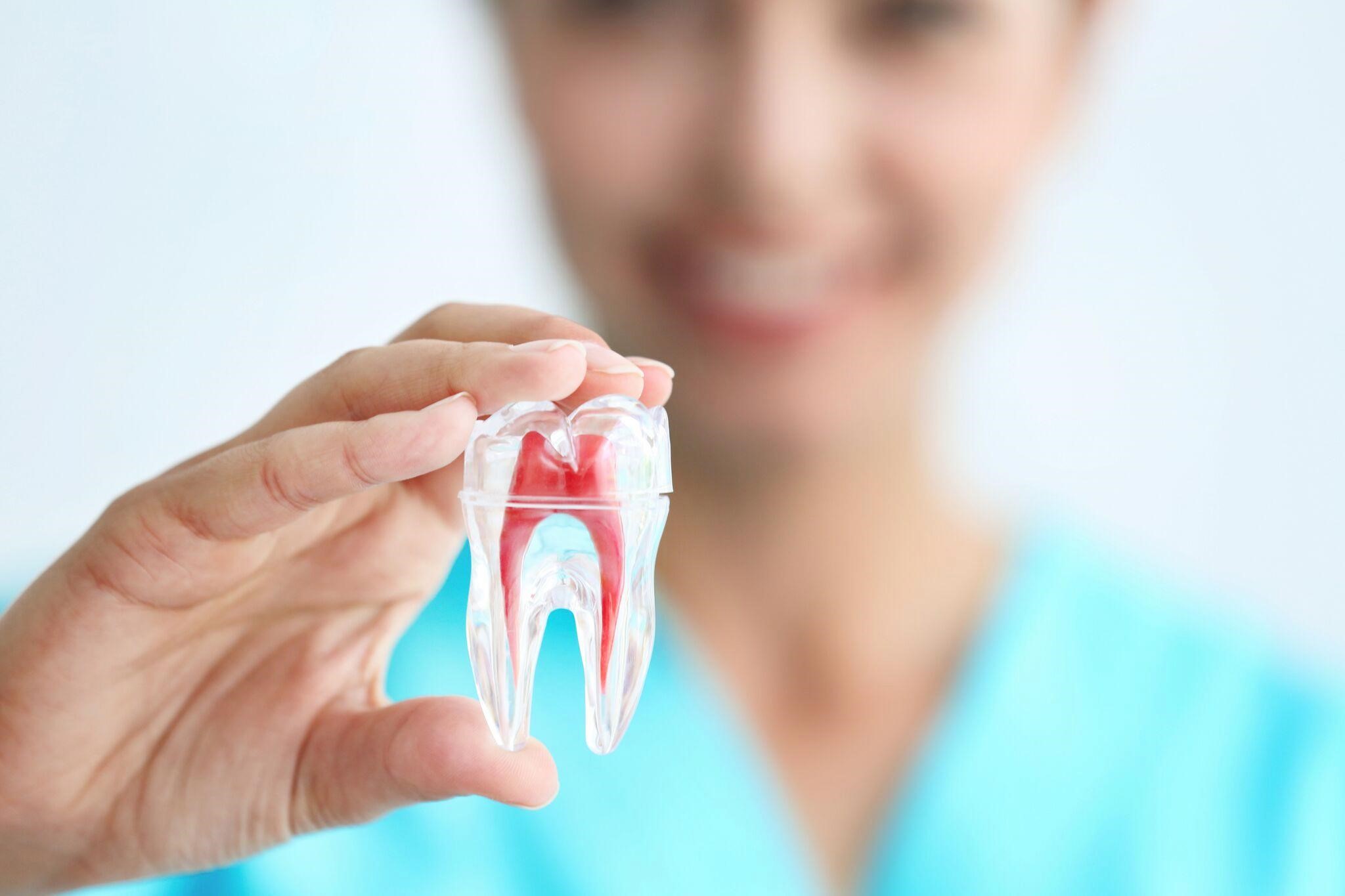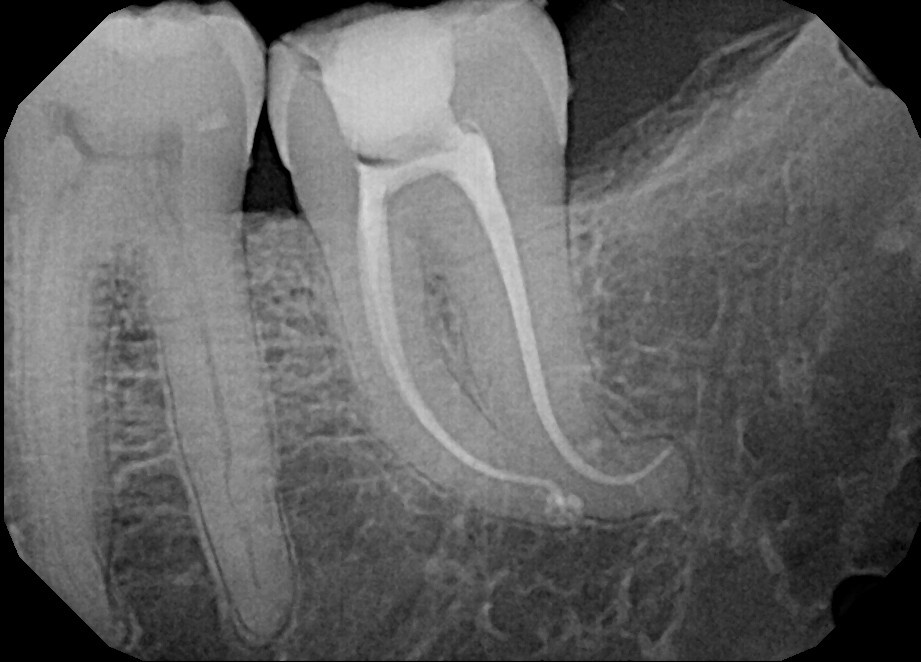Tri Dental - Root Canals and Laser Root Canals
Root Canals and Laser Root Canals
Root canals are essential endodontic treatments for saving your damaged or infected tooth. Traditional root canal treatment removes infected tissue and deep decay to preserve your healthy tooth structure. This can effectively heal the damage to your tooth pulp and heal your tooth without the need for extraction.
On the other hand, laser root canal procedures use laser technology to clean and disinfect your root canal more efficiently. Laser root canals can often reduce the number of repeated dental procedures needed, offering you a faster and more comfortable experience.


What Is a Root Canal Procedure?
A root canal procedure is a multi-step treatment that aims to remove infected pulp inside your tooth and preserve your tooth's structure. It typically starts with our dentist or endodontist near you taking X-rays to assess the extent of your infection. We will also use local anesthesia to numb the area, followed by drilling a tiny hole into your tooth to reach the pulp chamber.
We will then remove the dental pulp, which consists of blood vessels, nerves, and connective tissue, using specialized instruments. We will thoroughly clean the inside of your tooth and disinfect it with antiseptic solutions to eliminate any remaining bacteria and prevent further infection. After cleaning your tooth, a rubber-like material called gutta-percha is used to seal your canals and prevent contamination.
When Might You Need a Root Canal?
You will need root canal treatment when the pulp inside your tooth, which contains essential nerves and blood vessels, gets infected or inflamed. This can happen because of deep decay, repeated dental procedures on the same tooth, or a chip or crack in your tooth. If your pulp becomes infected, it can cause significant discomfort and even lead to an abscess if you do not treat it.
Possible signs could be intense discomfort when biting or chewing, blemishes on your gum line, a fractured or broken tooth, extended sensitivity to extreme temperatures, inflamed or sensitive gums, or a discolored tooth. This treatment removes infected pulp, cleans inside your tooth, seals to prevent infection, saves your tooth, and relieves your pain.


Benefits and Potential Risks of Root Canal Treatment
One of the main advantages of root canal treatment is that it saves a tooth that might otherwise need to be pulled out. By keeping your natural teeth, you can maintain your usual bite and avoid needing fake teeth or replacements, which often require more maintenance. This helps you keep a healthier and more natural smile. The treatment removes the infection and eases your pain, allowing you to return to daily activities without discomfort.
Laser Root Canals: The Advanced Approach
Laser root canal treatment, performed by our expert endodontist near you, is a cutting-edge method of dental care that is more comfortable and quicker than traditional procedures. This advanced treatment uses laser technology to precisely remove infected tissue from your tooth's canal system.
The laser light effectively kills bacteria and thoroughly cleans your canal, ensuring a higher level of disinfection. One significant advantage of this method is that it causes minimal damage to your tooth structure and nearby tissues, thereby preserving more of your natural tooth.


The Technology Behind Laser Root Canals Explained
The crucial part of a laser root canal procedure is the laser itself. These lasers produce focused beams of light energy that our skilled general dentist can control accurately.
This precision allows our experts to target and remove the infected pulp tissue inside your tooth without harming nearby healthy tissues. Unlike traditional methods of laser treatment, which involve mechanical removal of your pulp, the laser method is often less invasive and can reduce discomfort during and after your procedure.
Why Laser Root Canals Are Amazing
Laser root canals have many benefits, making them a favorite among restorative procedures for protecting and safeguarding your teeth. Some of the benefits include:
Less Pain: One of the biggest perks of laser root canal treatment is that it often results in less discomfort than traditional methods. The laser works with pinpoint accuracy, only targeting the infected part and leaving your healthy tissues untouched.
Quicker Healing: Thanks to the laser's ability to clean and disinfect thoroughly, your tooth can heal faster. This means you'll be on your way to feeling better in less time.
Minimal Bleeding: Lasers help to reduce bleeding during your procedure, making the whole experience less invasive and smoother.
Lower Infection Risk: The laser sterilizes the area as it works, reducing the chances of any postoperative infection. This extra level of cleanliness further ensures a successful outcome.


Debunking the Myth: Are Root Canals Painful?
Have you ever wondered if root canals are as painful as people say? Well, they're not! Root canal treatments are much more comfortable, thanks to modern dental techniques and improved anesthesia. Most people find them similar to getting a filling, with minimal discomfort.
During your procedure, you'll receive local anesthesia to ensure you don't feel any pain. Afterward, you might have some tenderness or sensitivity, but this can be managed with over-the-counter pain relievers and usually goes away within a few days.
What to Expect During Your Root Canal Treatment
During your root canal treatment appointment, you can expect the following steps:
- Numbing Up: Initially, our dental professional will administer a local anesthetic to the region surrounding your tooth to guarantee a pain-free experience.
- Opening Your Tooth: We will drill a small hole into your tooth to reach your tooth canal system.
- Cleaning Out Your Infection: The dentist will remove the infected pulp inside your tooth and clean your root canal using special tools.
- Filling and Sealing: Once cleaned, your canal will be filled and secured with gutta-percha and dental adhesive.
- Placing Your Crown: We will then place a crown over your tooth to protect it and restore its natural look.
You might be wondering, "How long does a root canal take?" Well, it all depends on the complexity of your case. Simple root canal procedures can take upwards of 30 minutes, but advanced root canal procedures can take upwards of 90 minutes.
How Much Does a Root Canal Cost?
Traditional root canal treatment costs can vary quite a bit depending on your unique needs. It mainly depends on how bad the problem is, which tooth needs fixing, and where you live. For instance, a molar typically costs more to treat than a front tooth due to its complexity.


